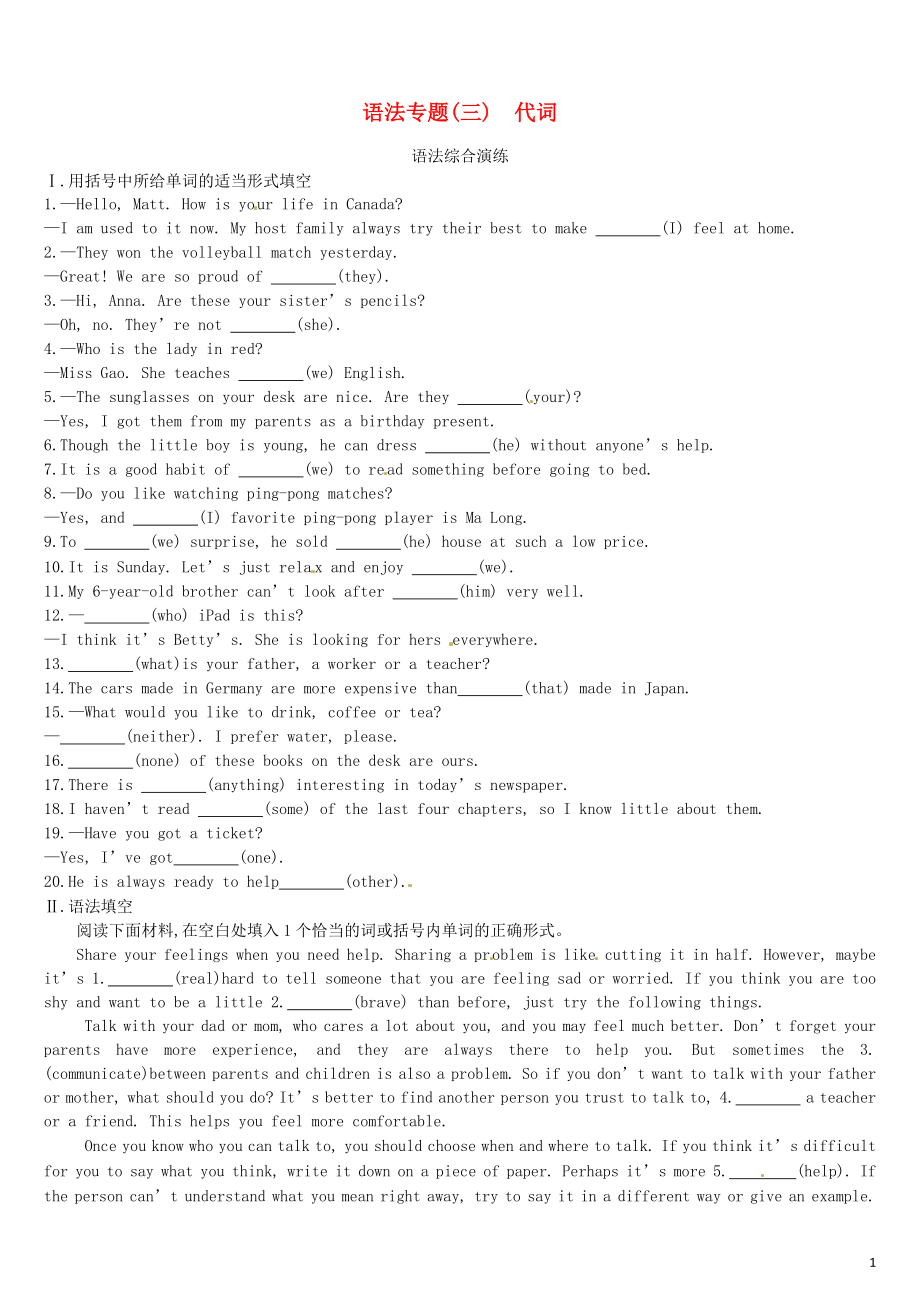《四川省綿陽市2019中考英語總復(fù)習(xí) 第二篇 語法突破篇 語法專題03 代詞綜合演練》由會員分享,可在線閱讀�����,更多相關(guān)《四川省綿陽市2019中考英語總復(fù)習(xí) 第二篇 語法突破篇 語法專題03 代詞綜合演練(3頁珍藏版)》請?jiān)谘b配圖網(wǎng)上搜索����。
1���、語法專題(三) 代詞
語法綜合演練
Ⅰ.用括號中所給單詞的適當(dāng)形式填空
1.—Hello, Matt. How is your life in Canada?
—I am used to it now. My host family always try their best to make (I) feel at home. ?
2.—They won the volleyball match yesterday.
—Great! We are so proud of (they).?
3.—Hi, Anna. Are these your sister’s
2���、pencils?
—Oh, no. They’re not (she).?
4.—Who is the lady in red?
—Miss Gao. She teaches (we) English.?
5.—The sunglasses on your desk are nice. Are they (your)??
—Yes, I got them from my parents as a birthday present.
6.Though the little boy is young, he can dress (he) without
3���、anyone’s help.?
7.It is a good habit of (we) to read something before going to bed.?
8.—Do you like watching ping-pong matches?
—Yes, and (I) favorite ping-pong player is Ma Long.?
9.To (we) surprise, he sold (he) house at such a low price.?
10.It is Sunday. Let’s just relax and
4�、 enjoy (we).?
11.My 6-year-old brother can’t look after (him) very well. ?
12.— (who) iPad is this??
—I think it’s Betty’s. She is looking for hers everywhere.
13. (what)is your father, a worker or a teacher??
14.The cars made in Germany are more expensive than (that) made in J
5、apan. ?
15.—What would you like to drink, coffee or tea?
— (neither). I prefer water, please.?
16. (none) of these books on the desk are ours. ?
17.There is (anything) interesting in today’s newspaper.?
18.I haven’t read (some) of the last four chapters, so I know little about the
6�����、m.?
19.—Have you got a ticket?
—Yes, I’ve got (one).?
20.He is always ready to help (other). ?
Ⅱ.語法填空
閱讀下面材料,在空白處填入1個(gè)恰當(dāng)?shù)脑~或括號內(nèi)單詞的正確形式��。
Share your feelings when you need help. Sharing a problem is like cutting it in half. However, maybe it’s 1. (real)hard to tell someone that you ar
7����、e feeling sad or worried. If you think you are too shy and want to be a little 2. (brave) than before, just try the following things. ?
Talk with your dad or mom, who cares a lot about you, and you may feel much better. Don’t forget your parents have more experience, and they are always there t
8�、o help you. But sometimes the 3. (communicate)between parents and children is also a problem. So if you don’t want to talk with your father or mother, what should you do? It’s better to find another person you trust to talk to, 4. a teacher or a friend. This helps you feel more comfortable.
9���、?
Once you know who you can talk to, you should choose when and where to talk. If you think it’s difficult for you to say what you think, write it down on a piece of paper. Perhaps it’s more 5. (help). If the person can’t understand what you mean right away, try to say it in a different way or
10����、give an example. Build confidence gradually by talking 6. small step every time. ?
Then try to 7. a good talker. Don’t waste time worrying about your look or what people think of you. If you find it hard to start a conversation, say something nice about people around you. Think about how gr
11��、eat you feel when someone says something nice to you. Doesn’t it make you want to keep talking to that person? It is worth 8. (have) a try! ?
Problems and 9. (worry)are normal in life. If you keep them in your heart and don’t talk about them with 10. (other), you will even fall ill at last
12、. It is the best not to run away from your problems. Just talk to someone about a problem, and you are halfway to solving it.?
參考答案
Ⅰ.1.me 2.them 3.hers
4.us 5.yours 6.himself
7.ours 8.my 9.our; his
10.ourselves 11.himself 12.Whose
13.What 14.those 15.Neither
16.None 17.something 18.any
13���、
19.one 20.others
Ⅱ.[主旨大意] 本文是一篇說明文�����。文章主要介紹了解決自己的心理問題的一些方法。
1.really hard是形容詞,前面一般用副詞修飾����。所以填really。
2.braver 根據(jù)than及a little可知用比較級braver����。
munication 分析句子成分可知,橫線上所填的詞在句中作主語,所以應(yīng)當(dāng)用其名詞形式,故填communication���。
4.like 根據(jù)前半句“It’s better to find another person you trust to talk to”及橫線后的“a teacher or a f
14、riend”可知,橫線上的詞表示列舉,所以填like�����。
5.helpful be動詞后用形容詞作表語,故填helpful。
6.a step是單數(shù),故橫線上是一個(gè)表示單數(shù)的限定詞;表示“一小步”,是泛指,用不定冠詞a。
7.be try to do sth.意為“努力做某事”,再由句意“然后努力成為一個(gè)健談的人”可知用be����。
8.having be worth doing sth.意為“值得做某事”,故填having�����。
9.worries worry是可數(shù)名詞,表示“煩惱的事”。句意:生活中的問題與煩惱是很正常的�����。
10.others 橫線上的詞作介詞with的賓語,所以用名詞;others意為“別人”。句意:如果你把它們放在心里,不與別人談?wù)撍鼈?你最后會生病的�。
3
 四川省綿陽市2019中考英語總復(fù)習(xí) 第二篇 語法突破篇 語法專題03 代詞綜合演練
四川省綿陽市2019中考英語總復(fù)習(xí) 第二篇 語法突破篇 語法專題03 代詞綜合演練

